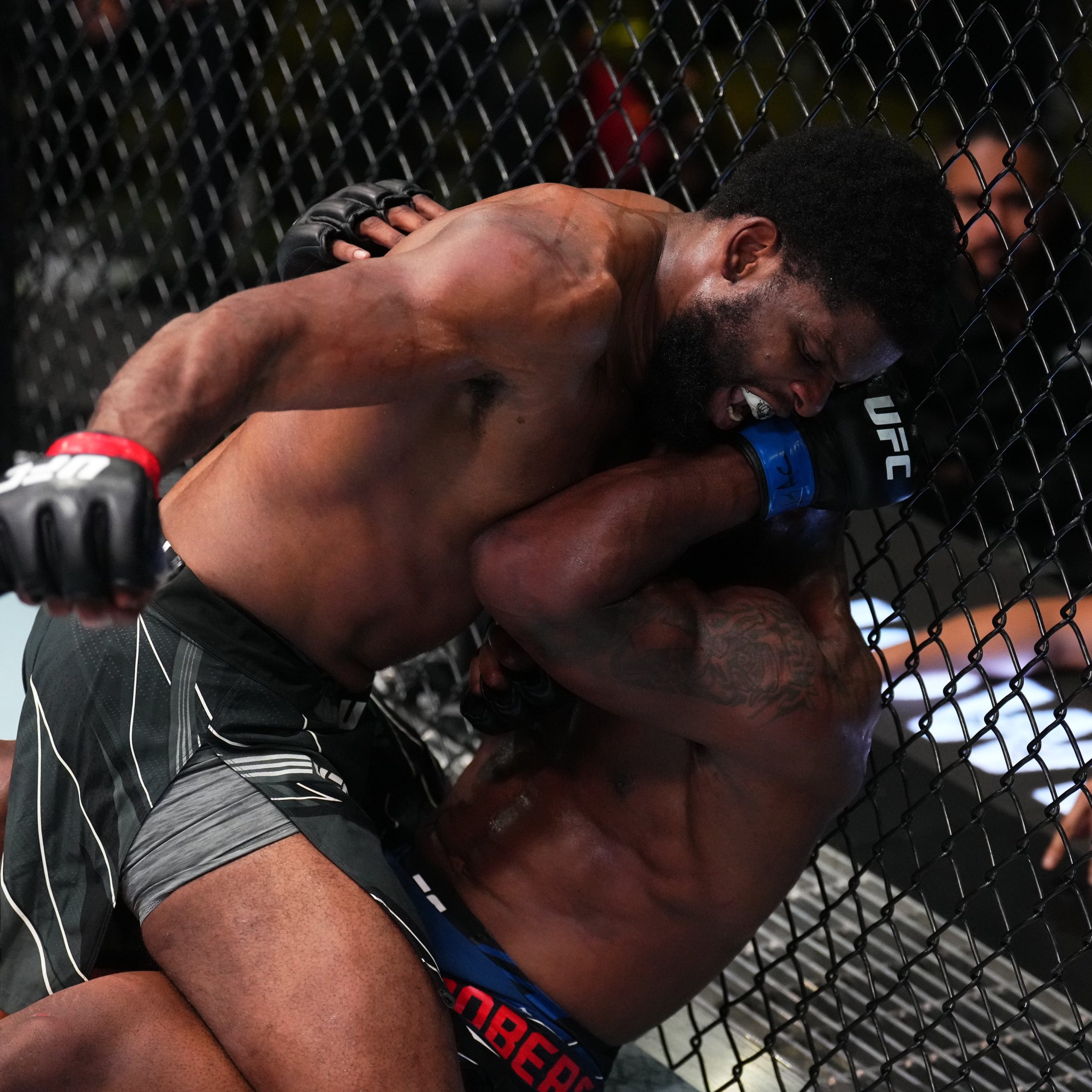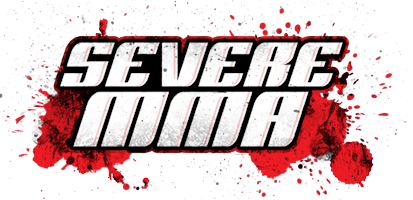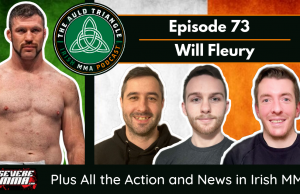

At UFC Vegas 58, Rafael Fiziev proved that he is worthy of jumping into the next set of the 155lb elite. His win over Rafael Dos Anjos shows us that he is of that next level. There are questions to be answered in the future, as every step up the ladder forces us to re-question much of our perceived notions about a fighter. But it is exciting to see fresh blood added into what is already a stacked divisional elite.
Caio Borralho out grappled Armen Petrosyan, Said Nurmagomedov won a unanimous decision over a tricky opponent in Douglas Silva de Andrade, flashes of brilliance mixed with some decision making that could be improved. Chase Sherman kept his UFC dreams alive with a Performance of the Night bonus win over Jared Vanderaa. Aiemann Zahabi took a win over Ricky Turcios and the main card was opened by a certified banger with Jamie Mullarkey and Michael Johnson combining for Fight of the Night.
Nestled next to the curtain jerker the 6”5, 205lb Kennedy Nzechukwu stepped out to his 7th UFC appearance. His entrance to the UFC came as he moved his professional record to 5-0 on DWCS, by way of an explosive finish over Dennis Bryant (5-1). His next assignment, was Scotland’s Paul Craig, losing by submission. Since then, he has had some great wins over Carlos Ulberg, Danilo Marques and Darko Stošić, before dropping losses to Da Un Jung and a split decision to Nick Negumereanu.
The overarching takeaway from this 7th appearance was belief. Belief in a fighter is an intangible skill that is as important as any applicable skill or experience. It is something that has seemingly been lacking from Nzechukwu, however in his display we watched the sun beam down, and the blossoming of a bud of belief, unfold in front of our eyes.
That belief came from his ability to be presented with a gameplan of grappling from Karl Roberson, to deter that gameplan from its success, by beating Roberson at his own game plan. This is method of fighting that Jon Jones made famous in his cinematic run to the title. Whilst Jones made a conscious decision to engage in a fight that favoured his opponent to prove dominance, Nzechukwu was forced too, and that in some ways is more impressive.
The first shot came within 20 seconds of the first round, Roberson circling out baiting Nzechukwu to fall into a head outside single leg. Roberson’s aims were to create a semi-circle arch step with his right leg, pushing weight through his right shoulder into the hip of Nzechukwu, forcing him to the mat. Instead, Nzechukwu began to push his weight into the frame of Roberson, and forcing his head to the inside space, in doing so he forced Roberson over his own posts and to the mat. Sensing back exposure, he took a reverse overhook and for a moment was in a back crucifix. As Roberson continued to wrestle up, Nzechukwu sprawled well, hoisting the left leg of Roberson to deny him pushing pressure, passing that hoist to the right leg, getting his cross face and getting back to his feet.
Immediately he began looking for front headlock attacks, before switching to an underhook and a chin strap, dragging Roberson up his body, and away from his hips. Double underhooks and a lowered base allowed Nzechukwu to reverse the clinch situation, and the African Savage began lowering that base again, using the underhook to drive Roberson’s shoulder high, and creating back exposure, a grapevine hook was offered for the dilemma of either stripping and giving back control, or being taken down with a broomstick sweep. Roberson gives back control. The eventual takedown is one of elegance and measured application of technique. Nzechukwu drives his right leg through the centre of Roberson’s base, this disrupts his ability to stand up right, coupled with the bodylock grip and shoulder pressure being placed into the ribs by Nzechukwu. As Roberson attempts to square up, Nzechukwu sweeps the right leg, using Roberson’s squaring momentum against him, completing the takedown.
That initial sequence is a minute in the making, a minute of charging the batteries of belief in Nzechukwu.
Nzechukwu takes a good posture of hips high as the hand fight begins. The dilemma’s he presents are:
- Attempting to strip the posts of Roberson, committing his weight to the mat and accepting the position.
- Hand fighting effectively enough to force Roberson into looking to improve his position due to the threat of committal to bottom and giving back exposure.
The latter happened, with Roberson looking to turn in to return to his feet. Nzechukwu intelligently moves to the back and places a grapevine hook. Here is where the rushing begins.
Kennedy begins to search for chokes and mandible strangles that are not yet there, the purpose of two sets of hooks is to create a circle around your opponents’ hips, restricting and slowing the movement of those hips, a primary method of escape, as Nzechukwu searches for that choke, Roberson begins his escape. Instead of maintaining the position, finding his hooks, and getting his own back to the mat, Nzechukwu rushes and looks for the choke, allowing Roberson to remove himself from back control and back to a turtle position.
At one point, Nzechukwu forgoes the search for chokes and back control for what looks to be a d’arce setup. Roberson monitors hands and just stands immediately. Whilst there is a mat return very shortly after, this is energy expenditure that’s not necessary. Every moment that Roberson is on the mat, carrying the weight of a heavier man, and not getting up is energy drained from his tank, and not from Nzechukwu’s.
The rest of round one is an oscillation of jaw cranks, half d’arce setups and a lack of true back control mixed with Roberson being mat returned.
The first two minutes of round two were far more measured and controlled. Nzechukwu hits a lovely double leg and hip rides as Roberson attempts to get up. Landing shots, working his man, draining the gas tank, not committing to anything other than hip riding, mat returns, and some strikes. He drops into the mount and locks up a gorgeous leg triangle, which vastly limits Roberson’s ability to get his feet under him. There are two moments that force Roberson to explode in this round, the first being the mount with the leg triangle, the second the grapevine with the handcuff. Nzechukwu should be taking big things from those moments, as these are the moments that Roberson is truly in trouble, truly at risk of being placed on the bad end of a dominant position.
The final round see’s the same right hand to a beautiful double leg. Nzechukwu drives through the right hand, all the way to the hips, and drags out the hips of Roberson, sliding him down the cage like a cleaning cloth to a dirty window. Dropping immediately into mount, we see the progressive reads, the progressive belief begins to etch itself into Nzechukwu.
The finishing sequence comes from a failed head and arm triangle. Roberson is forced to buck and turn to his side to bring his right elbow into the inside space to relieve the choke. As he does so Nzechukwu rides his right leg up behind his back, making it difficult to put his back flat on the mat. Again, the dilemma of does Roberson give his back completely, or explode some more to try to turn his back to the mat, get to a hip and get back to half guard? Neither is the answer. Nzechukwu doesn’t allow it. He finds a handcuff, and frames on the side of the head with the same elbow that’s going to stop the fight. Nzechukwu rides out the final writhing of Roberson as he sets his pneumatic elbow to smash mode, and it digs a hole into the side of Roberson’s head until Herb Dean stops the fight.
We learnt something in this fight, we learnt that confidence could develop in front of our eyes. Let’s see whether that confidence seeps into the future of Kennedy Nzechukwu.



